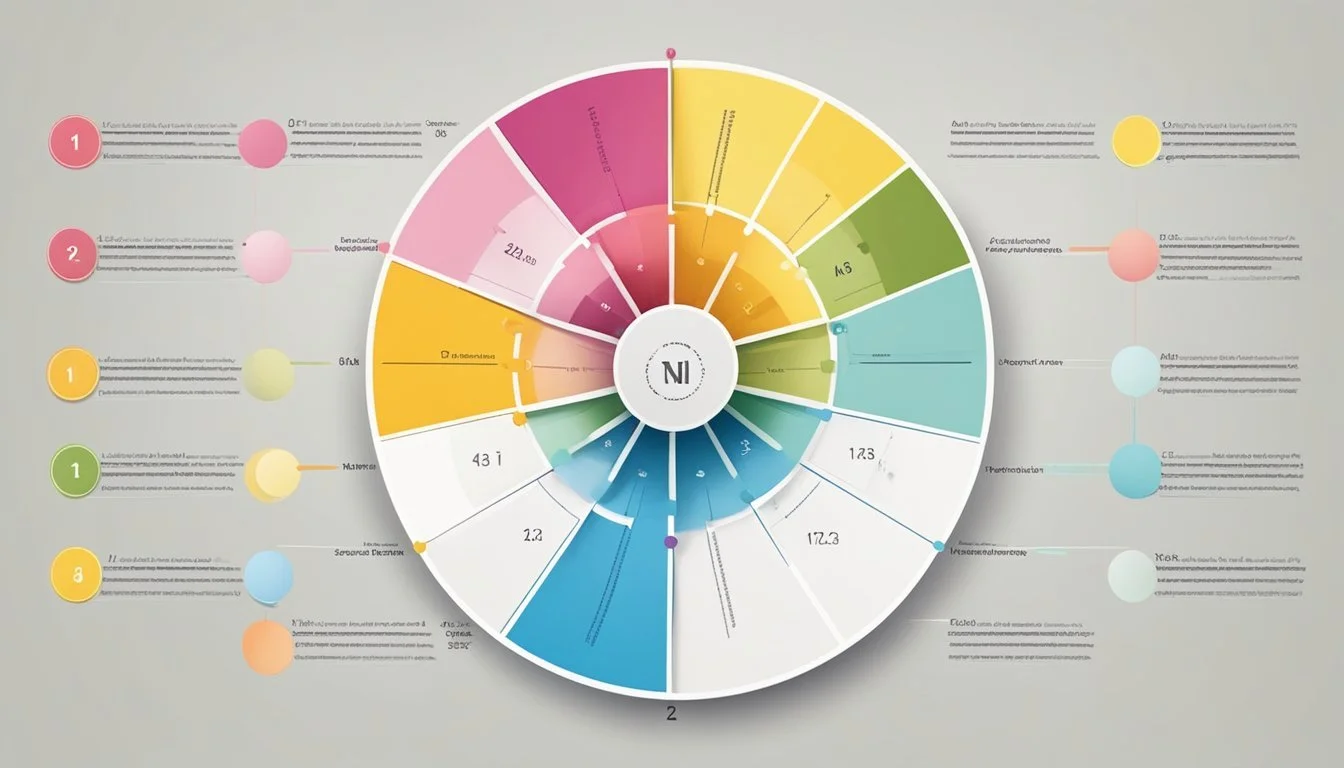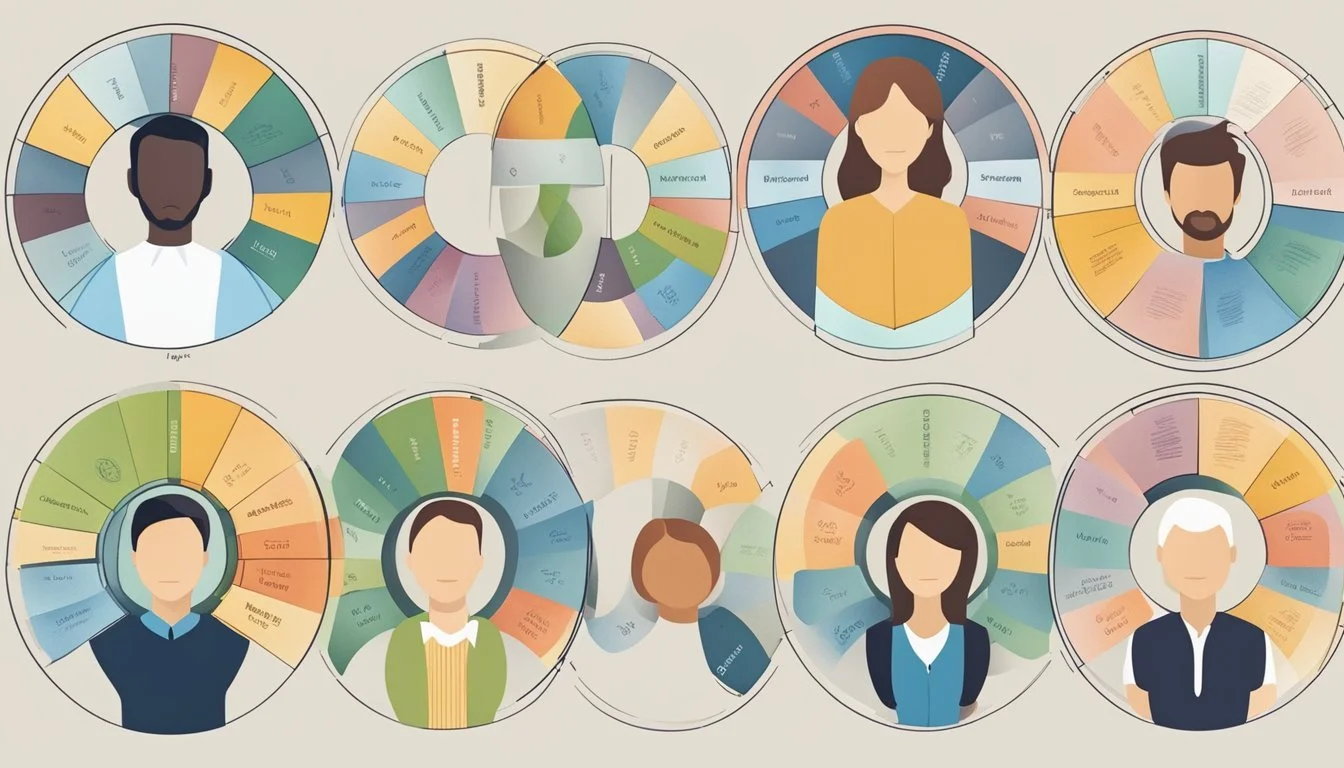Unlocking Potential: Explore the 12 DISC Personality Types for Success
Personality assessment tools offer valuable insights into human behavior and interactions. The DISC model is one such framework that categorizes individuals into four main personality types: Dominance, Influence, Steadiness, and Conscientiousness. By expanding on these core types, the 12 DISC personality types provide a more nuanced understanding of individual traits and tendencies.
This refined approach to personality classification allows for greater precision in identifying personal strengths, challenges, and optimal work environments. Understanding these personality types can benefit both individuals and organizations, fostering improved communication, team dynamics, and career development. The 12 DISC personality types offer a comprehensive framework for self-awareness and interpersonal effectiveness.
1) Dominant David
Dominant David exemplifies the core traits of the D personality type in the DISC model. He is a bold and assertive individual who thrives on challenges and taking initiative. David's natural leadership abilities shine through in his decisiveness and results-oriented approach.
In the workplace, David excels at problem-solving and driving projects forward. He is not afraid to make tough decisions or take risks to achieve his goals. His confidence and direct communication style often inspire others to follow his lead.
David's competitive nature fuels his ambition and desire for success. He sets high standards for himself and those around him, always pushing for excellence. This can sometimes come across as demanding or impatient to others.
While David's strengths lie in his ability to take charge and get things done, he may struggle with tasks that require patience or attention to detail. He prefers to focus on the big picture rather than getting bogged down in minutiae.
In social situations, David tends to be outspoken and enjoys engaging in lively debates. He is not one to shy away from confrontation and often thrives in high-pressure environments.
2) Influential Iris
Influential Iris embodies the "i" style in the DISC personality framework. This personality type is characterized by an outgoing and people-oriented nature. Iris thrives in social situations and excels at building relationships with others.
Communication is a strong suit for Influential Iris. She possesses natural charm and charisma, making it easy for her to connect with people from all walks of life. Her enthusiasm is contagious, often inspiring those around her.
In the workplace, Iris shines in roles that involve collaboration and teamwork. She has a talent for motivating others and creating a positive atmosphere. Her optimistic outlook helps her navigate challenges with a can-do attitude.
Decision-making for Iris is often based on intuition and feelings rather than cold, hard facts. She values personal connections and may prioritize maintaining harmony over confronting difficult issues. This can sometimes lead to avoiding necessary conflicts.
Iris's spontaneity and love for new experiences make her adaptable to change. She enjoys variety in her work and personal life, often seeking out novel situations and challenges. Her creativity allows her to generate innovative ideas and solutions.
3) Steady Sam
Steady Sam embodies the S (Steadiness) personality type in the DISC model. This individual values stability, cooperation, and harmony above all else. Sam thrives in predictable environments and prefers a calm, steady pace.
Steady Sam is known for being patient, supportive, and reliable. They excel at creating and maintaining strong relationships with colleagues and friends. Their empathetic nature allows them to be excellent listeners and team players.
In the workplace, Sam prefers clear instructions and established routines. They are highly dependable and will consistently deliver quality work. Sam excels in roles that require attention to detail and a methodical approach.
While Steady Sam is adaptable, they may struggle with sudden changes or high-pressure situations. They prefer to have time to process new information and adjust gradually. Sam's desire for harmony can sometimes lead to difficulty in confrontational situations.
Steady Sam's strengths include loyalty, persistence, and the ability to create a stable work environment. Their calm demeanor and supportive nature make them valuable team members in any organization.
4) Conscientious Clara
Conscientious Clara represents the C personality type in the DISC assessment. She is characterized by her meticulous attention to detail and unwavering focus on accuracy.
Clara thrives in structured environments where she can apply her analytical skills. She approaches tasks systematically, carefully considering all aspects before making decisions.
Her cautious nature leads her to question and scrutinize information thoroughly. Clara values quality and precision in her work, often striving for perfection.
In group settings, Clara tends to be more reserved and reflective. She prefers to observe and analyze before contributing her well-thought-out ideas.
Clara excels at solving complex problems, using her logical mindset to break down issues into manageable components. She is adept at identifying potential pitfalls and devising effective solutions.
While Clara's perfectionism can sometimes slow her progress, it also ensures high-quality outcomes. She takes pride in delivering reliable and accurate results consistently.
Clara's conscientious approach makes her a valuable team member, particularly in roles requiring attention to detail and critical thinking.
5) Dominant Donna
Dominant Donna exemplifies the classic D personality type in the DISC model. She is a natural-born leader with a strong drive for results and achievement. Donna thrives on challenges and isn't afraid to take risks to reach her goals.
In the workplace, Donna is direct and assertive in her communication style. She prefers to get straight to the point and values efficiency above all else. Her decisiveness allows her to make quick choices, even in high-pressure situations.
Donna's confidence and ambition often inspire those around her. She excels at problem-solving and taking initiative on projects. However, her forceful nature can sometimes come across as intimidating to others.
When working with Dominant Donna, it's important to be clear and concise. She appreciates people who can match her pace and provide direct answers. Donna responds well to challenges and opportunities that allow her to showcase her leadership skills.
While highly effective in many situations, Donna may need to be mindful of others' feelings and perspectives. Developing patience and active listening skills can help her build stronger relationships with colleagues and team members.
6) Influential Ian
Influential Ian embodies the "I" type in the DISC personality system. He thrives on social interactions and possesses a natural ability to connect with others. Ian's enthusiasm is infectious, often inspiring those around him with his optimistic outlook.
In group settings, Ian shines as a charismatic communicator. He easily engages others in conversation and enjoys being the center of attention. His persuasive skills make him adept at motivating teams and building consensus.
Ian's strengths lie in his people-oriented approach. He excels at networking, building relationships, and creating a positive atmosphere. His friendly demeanor helps put others at ease, making him a valuable asset in customer-facing roles.
While Ian's focus on social connections is a strength, it can sometimes lead to challenges. He may struggle with tasks requiring extended periods of solitary focus or detailed analysis. Ian might also have difficulty delivering tough messages or making unpopular decisions.
In the workplace, Ian performs best in roles that allow him to interact frequently with others. Sales, public relations, and team leadership positions often suit his outgoing nature and persuasive abilities.
7) Steady Sophia
Steady Sophia embodies the core characteristics of the Steadiness (S) personality type in the DISC assessment. She is patient, reliable, and calm under pressure. Sophia thrives in stable environments and prefers a consistent routine.
In the workplace, Steady Sophia excels at teamwork and collaboration. She is a supportive colleague who listens attentively to others and offers help when needed. Her diplomatic nature makes her an excellent mediator in conflicts.
Sophia's approach to tasks is methodical and thorough. She prefers to take her time to ensure accuracy and quality in her work. This attention to detail makes her valuable in roles that require precision and consistency.
In social situations, Steady Sophia is warm and approachable. She forms deep, long-lasting relationships and is known for her loyalty to friends and family. Her empathetic nature allows her to connect easily with others.
While Sophia adapts well to most situations, she may struggle with sudden changes or high-pressure environments. She prefers to have time to process information and make decisions carefully. Steady Sophia's strengths lie in her reliability, patience, and ability to create harmonious environments.
8) Conscientious Carl
Conscientious Carl is a meticulous and detail-oriented individual who thrives on accuracy and precision. He approaches tasks with a systematic mindset, carefully analyzing every aspect before making decisions.
Carl values structure and order in his environment. He excels at creating well-organized systems and processes to ensure efficiency and quality in his work.
Attention to detail is Carl's strong suit. He takes pride in producing error-free results and often double-checks his work to maintain high standards.
Carl prefers to work independently, allowing him to focus on tasks without distractions. He may struggle with sudden changes or rushed deadlines that interfere with his methodical approach.
In social situations, Carl can appear reserved and thoughtful. He carefully considers his words before speaking, prioritizing accuracy over quick responses.
Carl's analytical nature makes him an excellent problem-solver. He excels at identifying potential issues and developing thorough solutions.
While Carl's perfectionism drives him to produce high-quality work, it can sometimes lead to delays as he strives for flawless results.
9) Daring Danny (Dominant)
Daring Danny embodies the quintessential Dominant personality type in the DISC framework. He exudes confidence and assertiveness in his interactions with others. Danny thrives on challenges and isn't afraid to take risks to achieve his goals.
As a natural leader, Danny often takes charge in group settings. He's quick to make decisions and values efficiency above all else. His direct communication style can sometimes come across as blunt or impatient to others.
Danny excels in high-pressure situations and is always ready to tackle new projects head-on. He's results-oriented and sets ambitious targets for himself and his team. His competitive nature drives him to constantly push boundaries and seek out new opportunities.
While Danny's boldness can be inspiring, it may also lead to conflicts with those who prefer a more cautious approach. He may need to work on developing patience and active listening skills to better collaborate with different personality types.
Danny's strengths lie in his ability to drive change and motivate others towards action. His confident demeanor and decisive nature make him well-suited for leadership roles in fast-paced environments.
10) Inspirational Ingrid (Influential)
Inspirational Ingrid embodies the quintessential Influential personality type in the DISC model. She thrives on social interactions and possesses a natural ability to motivate others. Her enthusiasm is infectious, often inspiring those around her to pursue their goals with renewed vigor.
Ingrid excels in communication, using her persuasive skills to build consensus and foster teamwork. She has a knack for seeing the best in people and situations, which contributes to her optimistic outlook on life.
In professional settings, Inspirational Ingrid shines in roles that involve public speaking, sales, or team leadership. Her charismatic nature allows her to easily connect with diverse groups of people and build strong relationships.
While Ingrid's sociable nature is a strength, it can sometimes lead to challenges in time management. She may struggle with focusing on detailed tasks or making decisions based solely on logic, as her emotional intelligence often guides her choices.
Ingrid's spontaneity and desire for variety can make her resistant to rigid structures or repetitive tasks. She performs best in dynamic environments that allow her to express her creativity and interact freely with others.
11) Sensitive Steve (Steady)
Sensitive Steve embodies the core traits of the Steady personality type in the DISC model. He is known for his calm demeanor and patient approach to situations. Steve excels at providing emotional support to others and creating a harmonious environment.
In the workplace, Sensitive Steve is a dependable team player who values cooperation and stability. He prefers a predictable routine and may struggle with sudden changes or high-pressure situations. Steve's strength lies in his ability to listen attentively and offer thoughtful advice.
Relationships are important to Sensitive Steve, and he puts effort into maintaining strong connections with friends and colleagues. He often acts as a mediator in conflicts, using his empathetic nature to understand different perspectives.
While Steve's considerate nature is an asset, it can sometimes lead to difficulty in asserting himself or making quick decisions. He may need encouragement to step out of his comfort zone and take on leadership roles.
Sensitive Steve thrives in environments that appreciate his steady, supportive approach. His reliability and genuine concern for others make him a valuable member of any team or social group.
12) Cautious Cathy (Conscientious)
Cautious Cathy embodies the Conscientious (C) personality type in the DISC assessment. She approaches life with a keen eye for detail and a strong desire for accuracy.
Cathy thrives in structured environments where rules and regulations are clearly defined. She carefully analyzes situations before making decisions, preferring to work behind the scenes to ensure everything is in order.
Her analytical nature drives her to seek out information and ask probing questions. Cathy values quality and precision in her work, often double-checking her efforts to eliminate errors.
In social situations, Cathy tends to be reserved and reflective. She keeps her emotions close to the vest, making it challenging for others to discern her true feelings.
Cathy excels at tasks requiring concentration and thoroughness. Her cautious approach helps her anticipate potential problems and develop contingency plans.
While her perfectionist tendencies can sometimes slow progress, Cathy's attention to detail often results in high-quality outcomes. She takes pride in producing work that meets exacting standards.
Understanding the 12 DISC Personality Types
The DISC model provides insights into human behavior and communication styles. It categorizes individuals based on four primary traits, which combine to form 12 distinct personality types.
The Origins of DISC Theory
DISC theory traces its roots to the work of psychologist William Moulton Marston in the 1920s. Marston identified four fundamental behavioral styles: Dominance, Inducement, Submission, and Compliance. These concepts laid the foundation for the modern DISC assessment.
In the 1950s, industrial psychologist Walter Clarke further developed Marston's ideas. He created the first DISC assessment tool, which measured an individual's tendencies in workplace situations.
Over time, researchers refined the model, leading to the current DISC framework used in personal and professional development. Today, DISC assessments are widely employed in corporate settings, team building, and leadership training.
The Four Primary DISC Types
The DISC model centers on four main personality types, each represented by a letter:
D (Dominance): Direct, decisive, and results-oriented
I (Influence): Outgoing, enthusiastic, and people-focused
S (Steadiness): Supportive, patient, and relationship-oriented
C (Conscientiousness): Analytical, precise, and detail-oriented
Each type has distinct characteristics:
Type Strengths Potential Weaknesses D Leadership, problem-solving Impatience, insensitivity I Communication, motivation Disorganization, impulsiveness S Teamwork, reliability Resistance to change, indecisiveness C Quality control, systematic thinking Perfectionism, overcritical
These primary types form the basis for understanding individual behaviors and communication preferences.
Combining DISC Traits
The 12 DISC personality types emerge from combinations of the four primary traits. Each person exhibits a blend of these characteristics, with one or two traits typically being more dominant.
Some common combinations include:
DI: Persuasive and results-driven
IS: Encouraging and collaborative
SC: Patient and detail-oriented
CD: Analytical and decisive
These combinations offer a more nuanced view of personality. For example, a DI type combines the assertiveness of D with the people skills of I, resulting in a charismatic and goal-oriented individual.
Understanding these combinations helps in tailoring communication, managing teams, and resolving conflicts. It allows for more effective interactions by recognizing and adapting to different behavioral styles.
Applications of DISC Personality Types
DISC personality types offer valuable insights for workplace dynamics and personal development. These applications help individuals and organizations leverage personality differences for improved communication, teamwork, and self-awareness.
DISC in the Workplace
DISC assessments help create more effective teams by identifying complementary strengths. Managers use DISC profiles to assign tasks that align with employees' natural tendencies. For example, high-D individuals excel in leadership roles, while high-C types thrive in detail-oriented positions.
DISC also improves workplace communication. Understanding colleagues' styles allows for tailored interactions. A manager might use a direct approach with a high-D employee but offer more emotional support to a high-I team member.
Conflict resolution benefits from DISC insights. Recognizing personality differences helps defuse tensions and find mutually agreeable solutions. Teams can leverage diverse perspectives for innovative problem-solving.
Using DISC for Personal Growth
DISC assessments provide a framework for self-reflection and improvement. Individuals gain awareness of their strengths and potential blind spots. A high-S person might recognize their need to be more assertive in certain situations.
People use DISC to identify areas for skill development. A high-I individual might focus on improving their attention to detail. DISC insights guide career choices by highlighting roles that align with natural tendencies.
DISC helps in personal relationships too. Understanding one's own and others' styles can improve communication with family and friends. It fosters empathy and reduces misunderstandings in social interactions.






